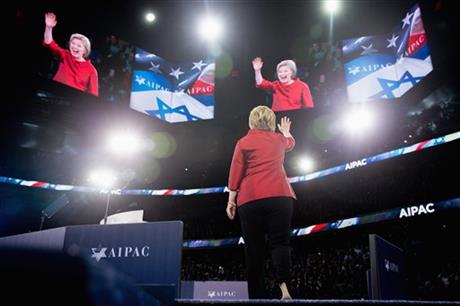
By LISA LERER
Hillary Clinton previewed an early line of Democratic attack against Donald Trump on Monday, casting the GOP front-runner as unqualified to handle heated international conflicts as commander in chief in a speech before a prominent pro-Israel advocacy organization.
Nearly all the presidential candidates are scheduled to address the annual policy conference of the American Israel Public Affairs Committee, which draws top Jewish leaders from across the world. The event is a traditional stop for U.S. politicians eager to demonstrate their foreign policy credentials by wading into Middle East conflicts.
Clinton, a former secretary of state, used her address not only to highlight her decades of work in the region but also to raise questions about Trump’s credentials and trustworthiness.
“We need steady hands,” she told thousands of activists gathered in Washington on Monday. “Not a president who says he’s neutral on Monday, pro-Israel on Tuesday and who-knows-what on Wednesday because everything’s negotiable.”
Sponsored Links
The 3 Best Cards For Those Of Us Without Perfect Credit
LendingTree
Meryl Streep Finally Reveals Her Outrageous Home (Photos)
Lonny
Israel’s security, she proclaimed to loud applause, “is non-negotiable.”
The comments were aimed at Trump, who sparked criticism from Republican allies of the Jewish state when he vowed to be a “sort of a neutral guy” on Israel in February. While the U.S. is officially neutral in the Middle East conflict, his statement sparked a marked rhetorical departure for typically strongly pro-Israel U.S. presidential candidates.
Trump plans to details his plans for a peace deal in remarks before the group on Monday night.
The billionaire businessman is using a rare day in Washington to try and woo a Republican establishment that’s been reluctant — and in some cases hell bent — on stopping his rise to the party’s nomination. He’s meeting with nearly two dozen top party officials, consultants and members of Congress in the afternoon before a news conference at Washington’s Old Post Office Pavilion, the site of a future Trump hotel.
The trip was unlikely to pass without controversy. There were protests planned at many of his stops, with a group of rabbis planning to boycott his speech before AIPAC.
Trump has a mixed record with pro-Israel Republicans. He’s refused to make the perennial Republican campaign promise of promising to move the U.S. Embassy from Tel Aviv to Jerusalem, drawing boos last year from the Republican Jewish Coalition.
Socially liberal Jews object to his controversial remarks about Mexican immigrants, women and Muslims, with some drawing analogies to the European persecution of Jews that eventually led to the Holocaust.
Clinton drew a similar parallel in her remarks, referencing a famous incident of a ship with Jewish refugees being turned away from the U.S. in 1939.
“We’ve had dark chapters in our history before,” she said. “America should be better than this, and I believe it’s our responsibility as citizens to say so. If you see bigotry, oppose it.”
Clinton, who received a standing ovation from the group, has a long history in the Middle East, including overseeing as secretary of state the Obama administration’s first attempt to broker Israeli-Palestinian peace. Her stance against Jewish settlements on land claimed by the Palestinians has been criticized by some in the pro-Israel community, but she has been received warmly by pro-Israel groups in the past.
She renewed promises to provide sophisticated defense technology to Israel and to quickly invite the country’s prime minister to the White House, if elected president. And she offered subtle criticism of the Obama administration, which has had public rifts with Prime Minister Benjamin Netanyahu.
“We will never allow Israel’s adversaries to think a wedge can be driven between us,” she said. “We must take our alliance to the next level.”
AIPAC bills itself as nonpartisan and has never endorsed a candidate. But the organization has played a big role in partisan political debates over issues of interest to Israel. Most recently, it worked hard to try and scuttle the Iran nuclear agreement, putting the group at odds with ardent deal supporters Clinton and Democrat Bernie Sanders, and to a certain degree, with Kasich, the lone Republican who has not said he would automatically rescind the pact.
Sanders— who is trying to become the first Jewish candidate to win a major party’s presidential nomination —is skipping the AIPAC meeting to campaign ahead of primaries in Utah and Arizona on Tuesday. He plans to lay out his own foreign policy vision with a speech in Salt Lake City later Monday. Clinton is to hold a get-out-the-vote event in Phoenix.
Republicans will also face off in two highly contentious contests in Arizona and Utah on Tuesday. Texas Sen. Ted Cruz hopes to close in on as many as 40 delegates in Utah, while Trump looks to build on his lead in Arizona’s winner-take-all primary.



